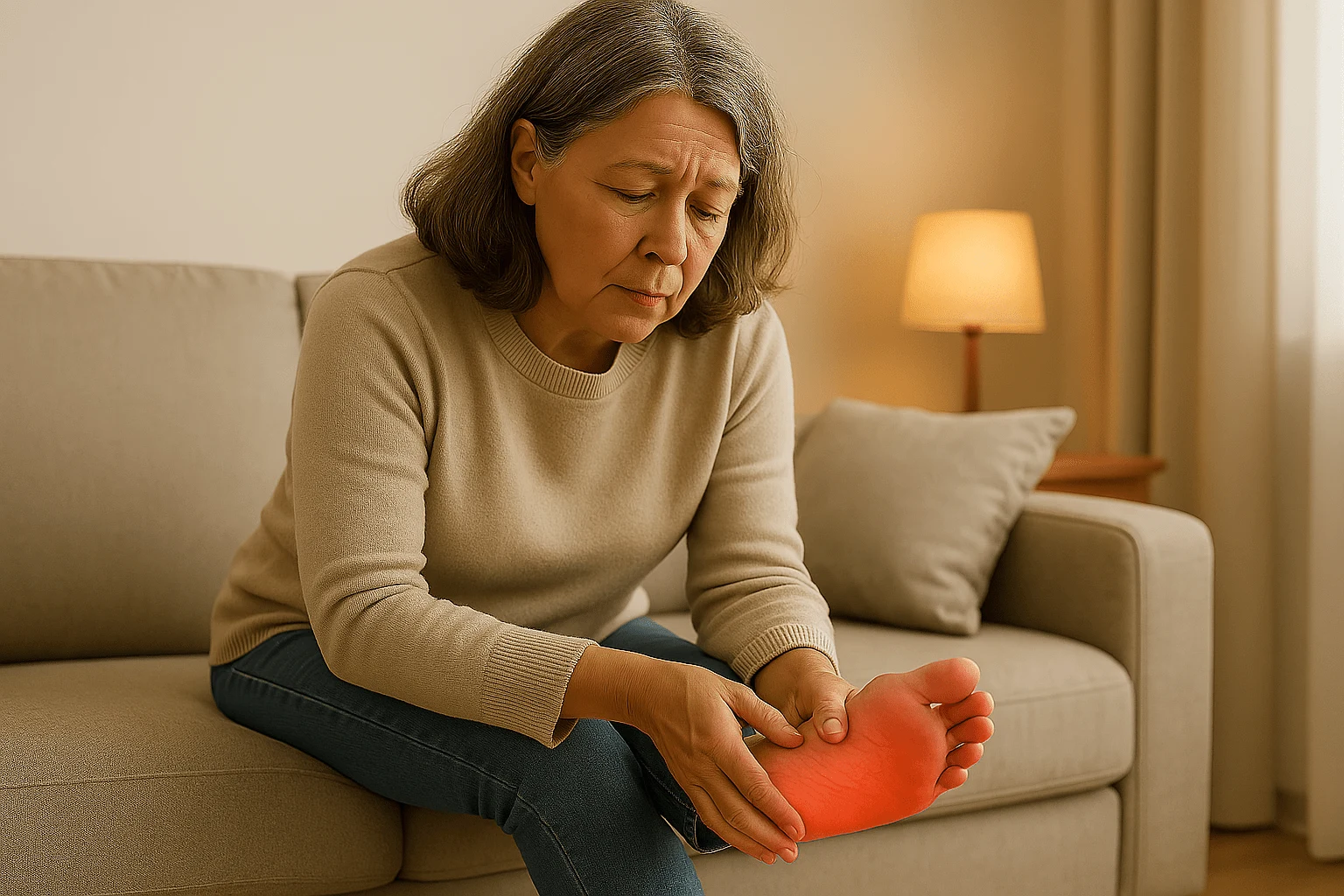Ever felt a strange tingling in your feet that just wouldn’t go away? Or maybe your hands go numb out of nowhere, leaving you wondering, “What was that about?”
If so, you’re not alone—and it might be more than just a fluke.
These odd sensations could be signs of neuropathy—a condition that affects your nerves and shows up in all sorts of sneaky, uncomfortable ways.
Here’s the good news: catching neuropathy early can make a world of difference. The sooner you spot the signs, the more power you have to slow things down—or even turn things around.
Let’s walk through the 8 most common signs of neuropathy, what they really feel like, and how to start getting relief.
So… What Does Neuropathy Actually Feel Like?
Think of your nervous system as your body’s communication highway. Messages zoom between your brain, spinal cord, and everything else—from your toes to your tummy. When neuropathy hits, those messages get scrambled, delayed, or just… don’t show up at all.
That’s when weird symptoms pop up, like:
- A tingling sensation when nothing’s touching you
- A sudden sharp pain that feels like a zap
- Or feeling like your sock is bunched up when it’s really not
It’s kinda like your nerves are trying to talk, but the line’s full of static. Depending on which nerves are affected, your symptoms might be mild… or feel totally life-disrupting.
Now let’s dive into the signs your nerves might be waving red flags
Sign #1: Numbness (Especially in Your Feet or Hands)

This one tends to sneak up on people. You might not even notice it at first—just a little “off” feeling in your toes or fingers. Maybe things feel duller. Maybe you can’t quite feel the texture of the floor beneath your feet.
But here’s the thing: that numbness isn’t harmless. It can quietly grow worse over time, making it easier to miss cuts, blisters, or sores—especially on your feet. And if you’ve got diabetes or circulation issues, that can be risky.
Try this:
- Check your feet daily, especially before bed
- Wear thick, cushioned socks or neuropathy-friendly slippers
- See your doc if the numbness sticks around or spreads
Did you know? Over 1 million leg amputations worldwide happen each year because of complications related to foot neuropathy. Early care really matters.
Sign #2: Sharp or Burning Pain

This one can be hard to ignore. We’re talking pain that shoots, burns, or stabs—sometimes out of nowhere. It might wake you up at night or make walking feel like you’re stepping on hot coals.
Common places? Your feet, legs, arms… or even deep in your hip, like sciatica pain radiating down your leg.
What can help?
Depending on the cause, things like magnesium, stretching, heat/cold therapy, or targeted supplements might ease that fire. (And yes, natural treatments like TENS units or acupuncture can be game-changers too.)
Sign #3: Feeling Off-Balance or Dizzy

Ever stood up and felt like the room tilted? Or maybe your legs just didn’t quite feel steady underneath you?
Balance issues can come from:
- Numbness in your feet (it’s hard to balance when you can’t feel the floor!)
- Inner ear nerve damage (called vestibular neuritis)
- Or even blood pressure dips from autonomic neuropathy
If you’ve ever felt dizzy, wobbly, or unusually clumsy—don’t brush it off. This is your body asking for help.
Gentle foot massages, nerve-friendly shoes, and daily balance exercises can really support you here.
Sign #4: Muscle Spasms and Twitching

Have you ever had a muscle suddenly tighten or twitch without warning? Like your leg jerking when you’re trying to relax—or your fingers curling in just a little too much?
Muscle spasms or cramps can be a not-so-fun part of neuropathy. Sometimes they’re painful, other times just annoying—but either way, they can mess with your day.
You might notice:
- Twitching under the skin (like little ripples)
- Cramping in your calves or feet
- Spasms that wake you up at night
This happens when the nerves controlling your muscles are firing off the wrong signals—or none at all.
Tip: Staying hydrated, gentle stretching, and magnesium-rich foods (like almonds and spinach) might help soothe those jumpy muscles.
Sign #5: Muscle Weakness

Ever tried to open a jar and felt like you suddenly lost your grip? Or dropped something that wasn’t even heavy?
That subtle weakness can be an early sign your muscles aren’t getting the “go” signals they need. Over time, that weakness can spread—and if left untreated, some people experience muscle loss (what doctors call atrophy).
It can start with small stuff, like:
- Having trouble lifting your arms or walking long distances
- Feeling shaky when you get out of a chair
- Struggling to carry groceries or open containers
The key here is early support—through movement, gentle strength-building exercises, and fueling your nerves with the right nutrients.
Sign #6: Stomach or Digestive Problems

This one surprises people. But yes, your gut is full of nerves too—and when they’re damaged, your digestion can go a little haywire.
If you’ve been dealing with:
- Bloating or feeling overly full
- Constipation or diarrhea
- Indigestion or heartburn
- A change in appetite
…it might not just be “something you ate.” It could be autonomic neuropathy, where the nerves that control your organs aren’t functioning properly.
And while that might sound scary, here’s the good part: gut-friendly lifestyle changes (like probiotics, fiber, and stress relief) can really help ease these symptoms.
Sign #7: Heat Sensitivity or Excess Sweating

Ever felt like you’re overheating faster than usual—or breaking into a sweat for no reason?
If you can’t tolerate warm weather like you used to, or you’re sweating buckets without even moving… that’s another clue your nervous system might be out of sync.
This is also part of autonomic neuropathy, and it’s often overlooked.
Other signs it might be linked?
- Dizziness when standing up
- Fluctuating blood pressure
- Digestive troubles paired with sweatiness
Staying hydrated, keeping cool, and talking to your doctor about underlying nerve function can point you in the right direction.
Sign #8: A Weird Sense of Tightness or Pressure

One of the lesser-known (but super common) neuropathy symptoms? That feeling like you’re wearing something tight—even when you’re not.
Some people describe it as:
- A “squeeze” around the arm or leg
- A tight sock or glove sensation
- Stiffness or heaviness in certain areas
It’s not in your head. That odd tightness is your nerves sending mixed messages again. Compression-like feelings can be subtle—or really uncomfortable—but they’re worth bringing up with your doctor.
Gentle yoga, warm baths, and anti-inflammatory habits can go a long way in easing that discomfort.
How Do I Know If It’s Neuropathy?
That’s a great question—and one only a doctor can truly confirm. But if you’re nodding along to several of these symptoms, it’s worth getting checked.
A physician can:
- Do a physical exam and ask detailed questions
- Order nerve conduction tests or bloodwork
- Help you find the root cause and a management plan
The goal? Catch it early, get a plan in place, and start supporting your body with the tools it needs to heal or stabilize.
You’ve Got More Control Than You Think

Neuropathy can feel scary, especially when it starts messing with your balance, your comfort, or your daily life. But here’s the hopeful part:
There’s so much you can do to find relief.
From natural supplements to targeted exercise, from foot care to gut healing—there are real, science-backed strategies that help calm nerve pain, reduce symptoms, and support healing over time.
Some folks find relief with:
- Acupuncture, massage, or TENS therapy
- Anti-inflammatory diets (think: leafy greens, turmeric, omega-3s)
- Nerve support supplements (like B vitamins, ALA, and magnesium)
- Gentle daily movement
What’s Your Next Step?
If this post resonated with you, take a deep breath—you’re already on the right path by learning more.
Here’s what you can do today:
- Write down any symptoms you’ve noticed (and how often they happen)
- Check your feet tonight—give them a quick once-over
- Start exploring natural ways to support your nerve health
And hey, if you’ve got a favorite tea, stretch, or tip that helps your symptoms—share it with us in the comments. You never know who it might help.
